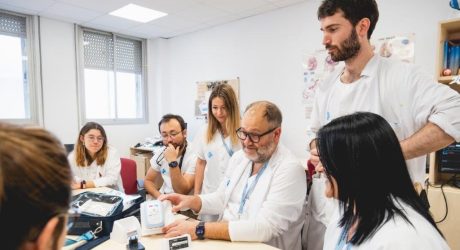Fifteen patients from Lleida take part in a clinical trial that leads to the approval of a new drug against Alzheimer’s disease
The therapeutic advances are in contrast to the devastating effects that COVID-19 has had on the evolution of many patients
Fifteen patients from the Cognitive Disorders Unit of the University Hospital of Santa Maria (HUSM) have taken part in the clinical trials that have led to the approval of a new drug against Alzheimer’s disease. Specifically, the Food and Drug Administration (FDA), based in the United States of America, has approved this new drug (aducanumab) which is currently pending evaluation by the European Medicines Agency. After 15 years in which no new drugs have appeared for this disease, this new drug can slow its progression. “This good news must be an open door to the appearance of more drugs that have an even greater impact on slowing cognitive deterioration in patients, because new molecules continue to be investigated in different international clinical trials,” says Gerard Piñol, head of the Cognitive Disorders Unit at HUSM, professor at the University of Lleida (UdL) and researcher in the Clinical Neurosciences Research Group at IRBLleida.
At the same time, researchers from the Cognitive Disorders Unit and the Clinical Neurosciences Research Group at the Institute for Research in Biomedicine (IRBLleida) are studying biomarkers in blood and cerebrospinal fluid that help in the early diagnosis of Alzheimer’s disease, which tomorrow, 21 September, marks World Alzheimer’s Day and affects 9,000 patients in the province of Lleida.
These therapeutic advances are contrasted with the devastating effects that COVID-19 has had on the evolution of many patients. “The compulsory social isolation for a long time, associated with the fear of many vulnerable people, together with the limitations imposed in many of the cognitive stimulation programmes, have had a strong impact on the cognitive and, especially, on the behavioural deterioration of many patients,” says Piñol.
During the last year, consultations of patients with post-COVID cognitive complaints have increased exponentially in the last year, a fact that represents a new challenge in the management of these individuals. For this reason, the Cognitive Disorders Unit is involved in several collaborative projects that aim to improve knowledge about the impact of COVID on patients’ cognition.
The Cognitive Disorders Unit also collaborates in different research projects together with national and European genetics consortiums with the aim of discovering new genetic risk factors and mechanisms involved in the disease. All these care and research projects have placed the Cognitive Disorders Unit among the leading memory units in the country.
Alzheimer’s disease
Alzheimer’s disease is a neurodegenerative disease that causes a progressive loss of recent memory to which is added the affectation of other cognitive functions during the evolution of the disease and, in some cases, behavioural alterations. According to data from the Federation of Alzheimer’s Associations of Catalonia (FAFAC), this disease affects approximately 85,000 people in Catalonia. Ageing is one of the main risk factors; therefore, with the increase in life expectancy, the number of people affected is expected to increase drastically and progressively in the coming decades. There are currently 9,000 people diagnosed with Alzheimer’s disease in Lleida.
World Alzheimer’s Day, declared by the World Health Organisation, is commemorated on 21 September, this year under the slogan “Zero omissions. Zero Alzheimer’s”. The aim of this slogan is to highlight the importance of early diagnosis as a basic and essential starting point, not only to detect cases in time, but above all to be able to set in motion the necessary therapeutic intervention processes that must be aimed at the whole family affected by Alzheimer’s disease or other types of dementia. Likewise, diagnosis is the essential tool to reduce the alarming figures that represent the under-diagnosis of this neurodegenerative disease which, according to the Spanish Society of Neurology, can reach around 30% of undiagnosed cases.
Text: ICS Lleida, Alt Pirineu i Aran and Gestión de Serveis Sanitaris




